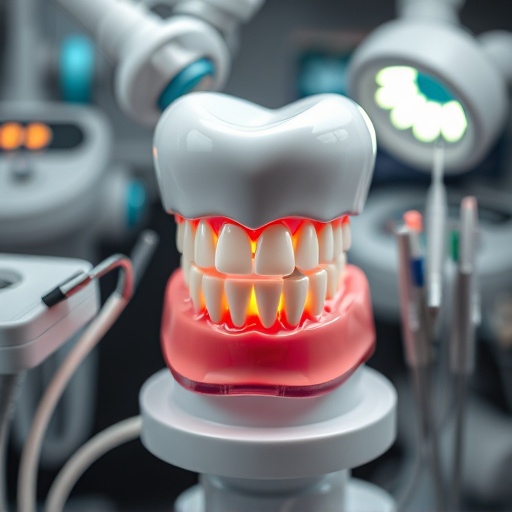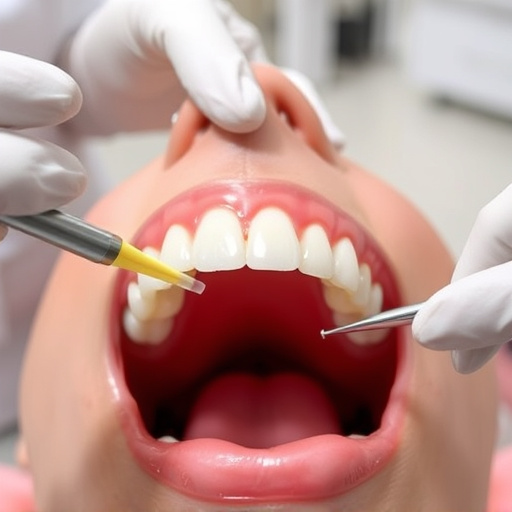Wisdom teeth removal involves a dental assessment, local anesthesia, incision, and extraction under guided care. Pre-op consultation, oral hygiene, and routine exams are essential. Post-op recovery requires rest, pain management guidance, salt water rinses, soft foods, and gradual return to normal activities with regular dental check-ups.
Looking to understand the wisdom teeth removal process? This comprehensive guide breaks down everything you need to know. From preparing for a comfortable experience to post-op care and recovery tips, we cover it all. Understanding the steps involved in wisdom teeth removal is crucial for a smoother procedure and quicker healing. Whether you’re considering extraction due to pain or simply as a preventative measure, this article offers valuable insights tailored to your needs.
- Understanding the Wisdom Teeth Removal Process
- Preparing for a Comfortable Experience
- Post-Op Care and Recovery Tips
Understanding the Wisdom Teeth Removal Process

The wisdom teeth removal process is a common procedure that involves carefully extracting the third molars located at the back of the mouth. These teeth often emerge partially or remain impacted beneath the gum line, requiring professional intervention. Understanding what to expect during this process is essential for patients seeking a comfortable and gentle experience. The first step in the procedure involves a comprehensive assessment during routine oral exams, where dental professionals examine the position and health of the wisdom teeth using advanced imaging techniques.
This initial evaluation helps determine whether extraction is necessary. In many cases, preventive dentistry through clear aligners or other orthodontic treatments can guide the positioning of wisdom teeth, preventing complications. During the actual removal, local anesthesia is administered to numb the area, ensuring a painless experience. The dentist then makes a small incision in the gum line and carefully removes the tooth, managing any potential discomfort with gentle manipulation and modern anesthetic techniques.
Preparing for a Comfortable Experience

Preparing for wisdom teeth removal should be a calming process, ensuring patients feel as relaxed as possible during what can sometimes be an anxious time. Before the procedure, it’s important to have a detailed consultation with your dental professional. They will assess your oral health, take X-rays, and discuss any concerns you may have. This is also an opportunity to ask about the wisdom teeth removal process, anaesthesia options, and recovery expectations.
A crucial part of preparation is maintaining good oral hygiene leading up to the operation. Keeping your mouth clean promotes healing and reduces the risk of infection. It’s recommended to schedule a routine oral exam before tooth extractions to ensure any other issues are addressed first, especially if you’re considering cosmetic dentistry as an adjunct to wisdom teeth removal.
Post-Op Care and Recovery Tips

After wisdom teeth removal, proper post-operative care is essential for a smooth recovery. It’s crucial to rest and follow your dentist’s recommendations regarding pain management. Over-the-counter pain relievers can help alleviate any discomfort, but always consult with your dental professional first. Avoid strenuous activities and heavy physical labor for the first few days to prevent bleeding and ensure a faster healing process.
Proper hygiene is another key aspect of post-op care. Rinse your mouth gently with warm salt water several times a day to promote healing and keep the area clean. Be mindful not to use a straw for drinking as this can create suction, disturbing the blood clot and potentially causing complications. Stick to soft foods for the first 24 hours, gradually introducing solid foods as discomfort decreases. Regular dental cleanings and check-ups after surgery are vital to maintain oral health, especially if you’re considering dental implants or children’s dentistry services in the future.
Wisdom teeth removal no longer has to be a source of anxiety. With modern techniques ensuring a comfortable and gentle process, preparation and post-op care tips can make the experience smooth and manageable. Understanding each step along the way empowers patients to navigate the journey with confidence, ultimately leading to a healthier oral cavity. For anyone considering wisdom teeth removal, embracing these strategies means embracing a safer, more relaxed path forward.














